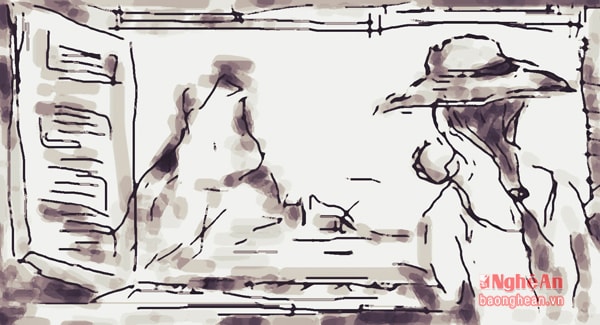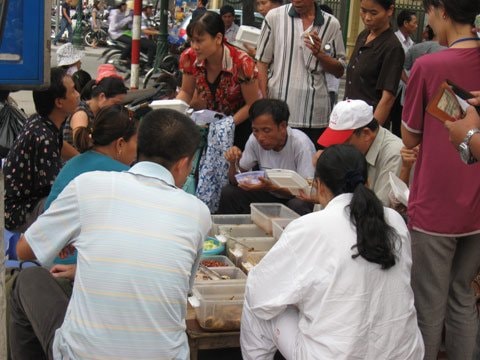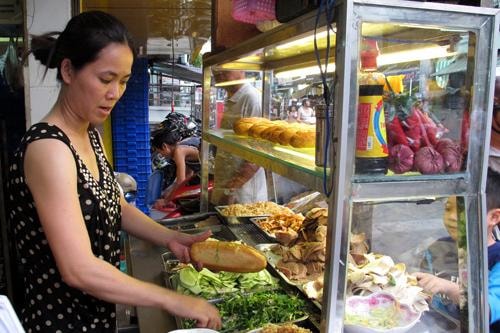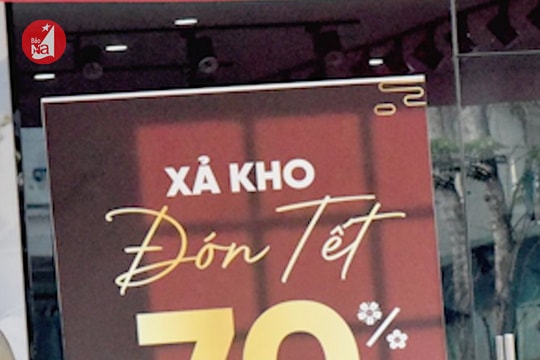Life without escape?
(Baonghean) - Dirty food is not the seller poisoning the eater, but we poisoning ourselves. If there are lives without a way out, confused meals in the era of dirty food, don't ask far away.
1.One afternoon more than 15 years ago, in a hotel with windows overlooking Ha Long Bay, I was stunned to see a Chinese girl eating an apple.
The Chinese girl works as a tour guide, and every week she leads groups of tourists to Vietnam. The apples she eats are very fragrant, bought from a supermarket in China, and she only needs to rinse them once under the hotel tap to be able to eat them, skin included.
It is completely different from the Chinese apples that are being sold by Vietnamese people in Vietnam. It is still the same apple, but even the aroma is full of chemicals, the skin is covered with a transparent layer of candle to keep it hard, and it is marinated to the point of completely losing the freshness of life. And, the fruit placed on the altar for a whole month has no trace of spoilage on the skin!
But why did the Chinese girl have to carry a fruit thousands of kilometers to Vietnam to eat? Why did she know that these fruits, grown in China, are safe, but when brought to Vietnam, you should never buy them? And what nationality are the traders who poison thousands of tons of fruit on the way from the farm to the hands of Vietnamese consumers?
I still think that the traders who make profit from dirty food are the hidden butchers of the century! Until…
 |
| Illustration: Nam Phong |
2.Ten years ago in Taipei, I often wandered around the vast Carrefour supermarket full of agricultural products and foodstuffs on weekends without buying anything. Or I stood absent-mindedly thinking in the middle of a tiny Seven-Eleven grocery store during lunch break. Because I missed home so much!
Every vegetable and fruit here has its origin clearly marked all the way to the farm. Imported meat and food are carefully quarantined, ensuring the quality is consistent with the packaging. Each office lunch box has a label clearly stating the ingredients, origin and calories for the meal, helping customers to weigh - measure - count - count accurately and feel secure with any food.
And I remember the dusty meals that street vendors carry along the streets of Hanoi. The dirty, rotten, and spoiled food that consumers turn their backs on, but the restaurants are willing to buy at cheap prices!
 |
| Are street food restaurants safe? Photo: Internet |
And the bunches of vegetables and beans bought at the market, we nervously pick and wash them, worrying about pesticide residues. For many years, my family has even completely eliminated some foods such as long beans and green beans from our meals to avoid becoming victims of greedy farmers.
But in Taipei, if dirty food is discovered, people don't curse the farmers, they condemn the market managers! And if food is found to be of poor quality, restaurants and suppliers turn their backs, and even warn people about it in advance!
And many office lunch restaurants and family dinner restaurants have done more than I have ever experienced: They encourage customers to bring their own chopsticks and spoons from home! This not only helps customers feel secure about the cleanliness of the utensils, but also helps limit the abuse of wooden chopsticks and disposable plastic spoons, contributing to protecting the environment and the freshness of the air!
The actions of those “private traders” made me realize that the fight against dirty food is not between buyers and sellers! It must be the responsibility of state managers. Until…
3.Five years ago, my brother had to close his sandwich shop on a small street corner in Hanoi. Just because he was too kind, committed to clean food. He made each sandwich as if it were a sandwich for his own family, not making dirty, fake sandwiches like those sold on the street.
That small bakery uses fresh and expensive ingredients that are no less expensive than those in star hotels. Raw vegetables are washed with boiled and cooled water. Even the milk used to soak the pate ingredients must be the best sterilized milk in Vietnam, 100% real cow's milk. They do not use the fresh milk that is being advertised but is actually reconstituted milk from Chinese milk powder.
And if sold at the market price of other stores, then in one morning, my brother would only make a profit of 36 thousand dong! While the shops next door would make five or seven times more profit! The kindness of a street vendor selling bread is invisible to anyone. And it is only worth 36 thousand dong! Who would believe in the conscience of a bread vendor, that he does not sell dirty food?
 |
| Whether food is clean or not depends on the conscience of the seller? (Illustration) |
And we will always nod our heads in approval of delicious, reasonably priced, and colorful food. On one hand, we demand clean food, but on the other hand, we calmly kill those who sell clean food!
We demand clean vegetables, but we only buy nice vegetables! We demand clean meat, but we refuse to pay for those “clean commitments”, we need cheap food!
There have been campaigns in the world calling on people to use ugly food. These are vegetables with worms, small, crooked fruits and vegetables. They could be underweight pigs, unappetizing chickens, or fish with unattractive colors. But the fact that people go to the market and choose to buy ugly food is a way to ensure clean food, and to limit sellers from joining hands with manufacturers to follow the trend of big-beautiful-cheap-dirty!
It turns out that the kindness of the buyer is more important than anything! Once the buyer is ready to kill the kindness of the seller! And the power of the decision of 80 million buyers is stronger than all the regulations, all the calls for cooperation for clean food.
4.But we still continue to demand big - beautiful - cheap - dirty food and on the other hand, condemn dirty food. Every two days, my friend transports a whole truck of cooled vegetables and fruits from Da Lat straight to Hanoi. He has been complaining about unsold products and losses for the past two years. Because all buyers say his vegetables are ugly, often wilted, and bruised.
Oh my god, bringing high quality vegetables and fruits straight from Da Lat to Hanoi, how can they be as shiny and fresh as the vegetables sprayed with preservatives, chemicals to keep vegetables growing, chemicals to keep flower petals shiny and beautiful and not fall off sprayed on vegetables... like other stores are using?
My neighbor has a banana garden, and is often sad because he cuts the whole bunch to sell at the market, but it takes forever to sell. Everyone complains that the bananas are still green, take too long to ripen, or fall apart. How can bananas ripen on the tree turn yellow all at once, unless someone dips the whole bunch in a vat of ripening chemicals?
I cannot answer the above questions. Dirty food is not the seller poisoning the eater, but we are poisoning ourselves. If there are lives without a way out, confused meals in the era of dirty food, do not ask far away. Those who only know good/cheap/delicious for themselves without thinking about this society, they poison their own meals and those of those who do not know why they become victims of the dirty food storm.
Rumor has it that businessmen are building apartment buildings with homegrown vegetables, boarding schools that house people and pigs together. They will make good money by exploiting fear. But they are a kindness in a society that is increasingly impoverished. Urbanization is never a good governance strategy for a decent country.
Trang Ha
| RELATED NEWS |
|---|


